Kate Wilson Case Exposing Spycops Concludes
Our report from the second and final week of Kate Wilson‘s landmark case, the culmination of ten years’ legal action challenging Britain’s political secret police. As an activist, Kate was spied on by at least six spycops.
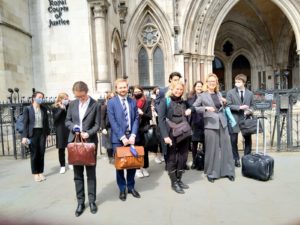
Kate Wilson (front, third from left) & her legal team, Royal Courts of Justice, 27 April 2021
Last week saw the opening of Kate Wilson’s case in the Investigatory Powers Tribunal. Kate, represented by Charlotte Kilroy, QC, put forward how her human rights were interfered with by multiple undercover police officers, particularly Mark Kennedy who deceived her into a relationship. We covered much of that in part one of this article.
Day 4 (Monday 26 April 2021)
This day was given over to the police to make their arguments, resuming from where they had left off last week. David Perry QC spoke for the entire day.
He was frequently interrupted by the three judges on the Tribunal panel. They were clearly uncertain about positions he was taking in relation to the law, and at times told him they considered his analysis illogical.
MARK KENNEDY TO BLAME
Perry maintained the position that Mark Kennedy was to blame for everything, and that the other officers were unwitting dupes of his lies. This included not being properly open with his principal cover officer, known only by the cipher EN31. It’s the police’s position that the evidence they’d been forced to disclose, such as the contact logs, needed to be read through this lens, given the lack of substantive witnesses.
‘Perry then goes back over his case from last week, stressing MK was selective and untrustworthy in the information he gave. MK portrayed me to be an influential activist in the UK and overseas, but that must be treated with caution because we now know that MK lied.’
Senior officers can’t have known, Perry argued, as otherwise they would have taken immediate action. Plus, all the senior officers in close proximity to Kennedy deny knowledge of his behaviour.
What followed was essentially a rehash of this point from different angles. All the blame lay with Kennedy, not EN31 or anyone higher up. For instance, it was Kennedy who set out the intelligence case for explicitly citing Kate as a target, namely that she was an influential activist both in the UK and overseas. He justified time spent with Kate and her family to EN31 by referring to chance events which were unavoidable or unwelcome.
‘Sir Stephen House (who knows nothing about the case) notes MK sometimes explains time spent with me as a “chance” event, and sometimes included political intelligence to what were entirely social and/or romantic events. Again, odd, they seem to think this is a defence.’
Perry relied on the witness statement from Lisa (another of the women Kennedy deceived into a relationship). She had shown that the contact logs held misleading information about him spending time with her and why it was required.
A particularly harsh example of this was the reasons given for Kennedy attending the funeral of Lisa’s father, which in a rare moment EN31 actually questioned. In Perry’s interpretation of the contact logs, Kennedy engineered an excuse as to why he had to be there, pressing on with the intrusion all the same, despite his cover officer’s concerns.
‘MK is authorised in 2006 to attend a deeply personal event – Lisa’s father’s funeral. Somehow police lawyers seem to think MK’s claim he delivered “sympathy cards” means his handlers were duped into letting him attend. Frankly this is insensitive nonsense from Perry QC.’
The next day, Charlotte Kilroy challenged this line of argument on the basis that Kennedy’s reasons were a distraction. The fact is, that the ‘reasons’ were a later detail provided by Kennedy after he had already told EN31 he was attending the funeral.
Furthermore, the cover officer didn’t ask why he had been invited (underlining the point that EN31 was not being intrusive because he already knew of the relationship).
Another occasion Perry relies upon as proof of Kennedy deceiving his managers, was when the undercover was recorded as off-duty but was in fact in Spain with Kate – something Kate was able to evidence with photos from the visit. Similarly, on other rest days in 2008 he was in fact in Scotland with Lisa.
SENIOR OFFICERS KNEW NOTHING
The authorisations for Kennedy’s deployments were based on Kennedy’s own intelligence. Senior officers had no reason to doubt his honesty as an officer, Perry argues, as at that point they did not know his credibility had been hopelessly compromised by his relationship with Kate and other women.
Of course, EN31 could have done a better job by being more diligent instead of placing so much trust in Kennedy. Especially as EN31 knew, and had spent time with, Kennedy’s family. However, it wasn’t really his fault; he was being misled as well. And who are we to doubt EN31 when, according to his statement, he had made it clear to Kennedy that any impropriety – such as sexual relationships – would be the end of his deployment?
‘Sir Stephen House himself accepts that there are multiple indications in the documents suggesting that EN31 knew or ought to have known. All he says about the other spycops officers is that there are “less indications” that they knew.’
The police barrister was treading risky ground. Kate’s case makes a strong argument that EN31 clearly did know of Kennedy’s sexual relationships, in which case EN31 was part of deceiving Kennedy’s family.
‘The police say we should think like officers at the time – there was (“rightly or wrongly”) operational benefit to MK to developing the relationship, and officers receiving evidence of a developing relationship would have seen it in that context. Erm… that is my case.’
Perry did accept that in situations where Kennedy might be called to give evidence, even if his sexual relationships had no direct bearing on the case, the very fact of them would damage his credibility all the same. He had breached police regulations and lied to get authorisations in place, so could not be put forward as a truthful witness.
Again, this was evidence in Perry’s eyes that the senior officers were ignorant. One such officer, O-24, who headed the National Public Order Intelligence Unit’s undercover unit which deployed Kennedy, apparently concurred, saying the policing and evidential purposes of the operation would have been affected by the relationships.
MARK KENNEDY ACTED AS AN AGENT PROVOCATEUR
For instance, the collapse of the Ratcliffe on Soar case in 2011 related not only to the discovery that Kennedy was a spycop, but also to evidence that he acted as an agent provocateur.
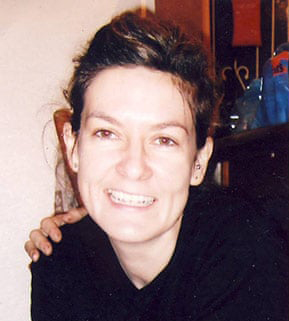
Undercover officer Lynn Watson, deployed at the same time as Kennedy, knew of his relationships
Curiously, Perry also relied on the claim that in any prosecution, the defendants would have to be told that Kennedy was an undercover; something that rarely happens. Other cases involving spycops indicate that police collapsed trials outright rather than letting an officer go to trial under their cover name.
Perry argued that other spycops deployed in proximity to Kennedy did not raise concerns over his relationships. He saw two possible explanations. Either they were unaware that the relationships were sexual, or they were aware, knew that it was wrong, and kept quiet. For Perry, both explanations were supportive of more senior officers not being in a position to have that knowledge.
This point was later challenged on the grounds that Perry was ignoring a third option: that it was an accepted cultural practice. Two of the undercovers closest to Kennedy – Lynn Watson and Marco Jacobs – both had their own intimate relationships with activists. Without question, Watson knew of Kennedy’s relationships. It was clear that there was complicity among the spycops, and a deliberate turning of a blind eye to this behaviour.
‘Another point is that spycops Lynn Watson and Marco Jacobs knew about MKs relationships. Perry says that the fact they didn’t raise concerns shows ‘They knew it was wrong and decided not to draw attention to it’. Again, he thinks that is a point in the defence the police.’
Perry did accept that in relation to Article 8 (the right to private and family life), senior managers had not done enough to supervise the operation and so protect Kate from excessive intrusion. However, he maintained the argument that management had little reason to express concern over Kennedy’s conduct at the time of the relationship.
Two important reports relied on by both sides came from the Serious Organised Crime Agency (SOCA) and HM Inspectorate of Constabulary (HMIC). Both examined the Mark Kennedy scandal in its immediate aftermath; SOCA in 2011, though it remained private, while a public version of the HMIC report was released in 2012 as ‘A review of national police units which provide intelligence on criminality associated with protest’.
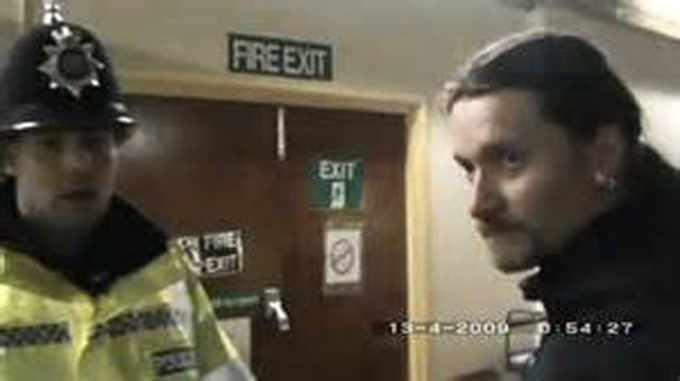
Spycop Mark Kennedy under arrest, Nottingham, April 2009
DRAX CLIMATE CAMP ARREST
Perry addressed the point made in these reports that Kennedy was resistant to management instructions on two occasions. One was his arrest at Drax Climate Camp in 2006. The other was a trip abroad in 2009 with an unnamed woman, defying parameters set by management. Here he was met by officers and ordered to return to the UK.
The question Perry sought to raise, was whether proper action was taken by Kennedy’s managers.
After Drax, Kennedy was suspended and not re-deployed until later in the year. It is clear though that he remained in the field, as during that time a car he was in with other activists was stopped by a police officer who recalled him from the Drax arrest.
Following his arrest at Ratcliffe in April 2009 he was effectively no longer operational. The contact log was suspended so there is little evidence from that time. His managers began working on an exit strategy for some time in 2010.
The unauthorised trip abroad in 2009, however, accelerated the decision to withdraw him from the field completely. His deployment was ended on 23 September 2009. Kilroy later drew the Tribunal’s attention to the fact that during this period the National Public Order Intelligence Unit (NPOIU) continued to produce reports based on Kennedy’s communications.
‘Perry is paying a lot of attention to the fact that MK was pulled out of his spycops role in late 2009. That is SIX YEARS after he first started having sex with women he was spying on. Shutting the door after the horse had bolted does not really cover it.’
Following this line of argument Justice Lieven remarked to Perry that, despite repeated breaches of his deployment and instructions, no disciplinary action was taken.
Lord Boyd commented that the unit seemed unaware of where Kennedy was when he was not operational, and this was a welfare issue since it was clearly not easy to switch the cover persona on and off. He asked if they did know his whereabouts, and were they checking on his welfare, particularly if he was having to maintain his cover for being redeployed. Perry answered that contact was maintained on rest days by EN31, but accepts there should have been more oversight.
INSTITUTIONAL SEXISM IN UNDERCOVER UNITS
A part of Kate Wilson’s case is that the deployments of Kennedy and his fellow spycops expose institutional sexism within the undercover units. This breaches Article 14 (freedom from discrimination).
Perry noted there are direct and indirect aspects to that claim. In his view, the Tribunal didn’t need to deal with the direct aspect as the policy and guidance of the time was gender-neutral.
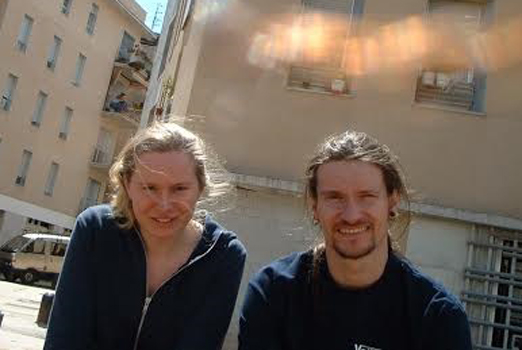
Kate Wilson and Mark Kennedy
As to indirect discrimination against women, Perry claimed there wasn’t a case to answer as one would have to establish that female undercovers faced different risks from male undercovers.
Justice Lieven was clearly not having it and took his arguments apart. She noted that one had to look at the actual outcomes, not the hypothetical ones advanced by Perry. Far more women were deceived across both main spycop units, the Special Demonstration Squad and National Public Order Intelligence Unit, so there was clearly a disproportionate impact.
Perry retreated to pleading against making stereotypical assumptions or generalisations about men and women. This still did not wash with Lieven – the factual evidence was against Perry. Lord Boyd also noted Charlotte Kilroy’s arguments on behalf of Kate Wilson around issues such as pregnancy creating a difference and having significant impact. Any analysis would have to take this into account as well – biological difference was not the same as stereotyping.
The judges also pointed out that indirect discrimination does not have to stem from issues in policy, training, or guidance, as Perry had suggested. Discrimination can also come from a pattern of behaviour. As the Equalities Act makes clear, it is the outcome that matters.
As typical when advancing an insubstantial argument or facing one crumble, Perry’s final response was that he’d raised the issue out of duty to the court, and it was in the Tribunal’s hands to make any final determination.
‘In summary the Metropolitan Police’s case seems to be that sexist discrimination by spycops is not important and the Tribunal should decline to make a ruling on [it]. Perry makes it clear that if the Tribunal does decide to make a ruling, he has no justification to offer for why it took place.’
‘IN ACCORDANCE WITH THE LAW’
Perry next addressed the case, made by Kilroy on Kate Wilson’s behalf, that the undercover operations were essentially unlawful on the grounds that they did not meet the test of necessity. This opened a very technical dive into the law, examining how the European Court at Strasbourg used and viewed necessity and proportionality as incorporated through the Convention on Human Rights. Likewise, whether the UK legislative regime covering undercovers adequately met those conditions.
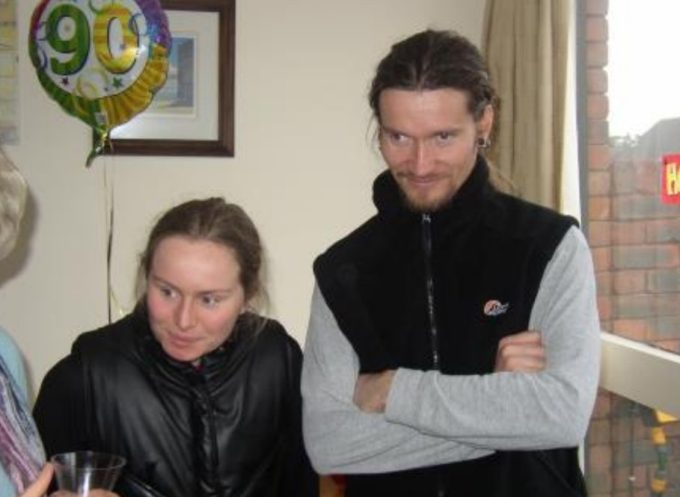
Kate Wilson and Mark Kennedy at Kate’s nan’s 90th birthday, January 2005
The arguments advanced and subsequent discussion are beyond the scope of what we can address in this report. To summarise, the Convention requires safeguards ‘in accordance with the law’. Perry appears to have been saying that because the UK had set up a legislative regime with other statutes, this fulfilled those requirements. He pointed to case law which seemed to say that Strasbourg was generally okay with the UK arrangements, albeit for other kinds of surveillance that had tighter controls.
Lieven immediately pointed out that what little safeguards, such as against sexual relations, might be present in law, were not there in practice or in the relevant codes of practice. Similarly, there were next to no safeguards against collateral intrusion in particular as had happened under these particular units.
‘Judge: In a case like this where the state puts spycops into someone’s life every day, almost every hour of the day, [it] is an intrusion far more serious than phone tapping, it is a profound intervention in someone’s life, based on legislation that does not prevent this.’
Perry answered that the failure was not in the law, but because there was no proper monitoring or supervision.
It was clear that Perry’s objective was to defend the undercover operations as meeting the ‘as necessary in a democratic society’ condition. Necessity meant, in the context of the undercover policing operations, that simply the possibility of a crime, however minor, was sufficient to meet the test. One could move from there straight to proportionality, the next stage in the process.
FAILURES
In the scheme he outlines for the police, the failures happened after the necessity stage of the process. It was clear that he wanted proportionality to carry the principle burden and was prepared to concede that was where the failures in the case could be found. He relied on findings in the SOCA review of the Mark Kennedy operation that he says indicated this.
At this point the technicality of the legal argument went up another notch, examining Strasbourg jurisprudence around necessity. Perry’s main point seemed to be that given Parliament had defined necessity as meeting a pressing social need, such as national security or public disorder, that was sufficient.
However, it was clear that the judges were unhappy with how Perry was setting out the distinctions between necessity and proportionality. They made the point that the Strasbourg courts took a more integrated approach rather than making proportionality subservient to necessity.
Perry’s final(ish) point on this issue was that the need to detect crime, or act in the interest of public safety, was sufficient to meet necessity. How this is done is the proportionality aspect.
‘Judge: So, in your argument, what is the role of the court then?
Perry: to assess proportionality, not necessity.
Judge: It would be extremely rare to find a case where a police officer had no belief at all that they were doing the right thing.’
AUTHORISATIONS
Having sought to argue that the authorisations of spycops were lawful in that they met the grounds of necessity, Perry then moved on to whether they were proportional. He effectively conceded that they were not, but his motivation at this point seemed to be about protecting those senior managers who had signed it all off.
He argued that the authorising officers were sincere in their belief that the tests of necessity and proportionality had been met. At this point Perry’s reasoning became circular again – this sincere belief arose from trust in Kennedy’s intelligence.
Perry wants the Tribunal to find that the initial authorisation of Kennedy was lawful, but subsequent ones failed because they were not proportional. With the first, they didn’t know enough about the Sumac Centre (where he was deployed) so they could not be more specific.
‘They also claim MK’s deployment at the Sumac needed to be wide reaching at the start, and the only error was not to have made it more specific later on. That is nonsense, there were other spycops (Rod Richardson) at the Sumac before MK.
‘The issues raised go beyond surveillance of me. The police cite many political events, including the death of Carlo Giuliani at the Italian G8 in 2001. But the police have presented no underlying evidence to support why that justified a spycops operation at the Sumac.’
The following day, Kilroy noted a total failure to acknowledge that authorising officers did know about the Sumac Centre as they’d already sent in a previous undercover, Rod Richardson, who had helped refurbish it.
She also noted there had been other spycops, such as Jason Bishop and Jim Boyling, who had reported on Kate Wilson earlier, as Kate pointed out:
‘In fact, the disclosure suggests that spycops had been gathering information specifically on me since my involvement in Reclaim the Streets and support for Immigration Detainees in 1999.’
Furthermore, the police were trying to have it both ways – either Kennedy was reliable or he wasn’t. A number of the officers involved in drawing up and signing parts of the authorisations would have known there was a clear falsehood – when NPOIU managers named Kate as a specific target on a basis that included the easily disprovable lie that she was as a principal organiser with a Leeds housing cooperative.
AN OBLIQUE THREAT TO THE TRIBUNAL
Perry’s next argument seemed to be a subtle attempt at sending a warning shot across the bows of the Tribunal. He asked the judges to consider the impact of making findings around Articles 10 and 11 (rights of free speech and assembly) in this case, as they would potentially opening the ‘floodgates’ of challenges to authorisations. Namely, in other criminal cases brought on the basis of undercover work, those going to court will seek to challenge authorisations of undercovers to have evidence thrown out.

Spycop ‘Rod Richardson’, refurbishing the Sumac Centre building, Nottingham, c.2001
If all this sounds like torturous nonsense, it’s because that’s how it came across in court. If anything, it shows the desperate lengths to which the police will go to defend necessity. They are clinging to the wide latitude they perceive they have in law as to who they can target, particularly political campaigners.
Another such situation emerged in Perry’s arguments shortly after, when he considered whether Kate had a case for interference with her Article 10 and 11 rights. It has been conceded that Kennedy interfered with her Article 10 rights (freedom of thought and speech) through the relationship, but the same is not said of her Article 11 rights (freedom of assembly).
Perry tried to argue that 10 and 11 were effectively a distraction from the real issues, the breaches of Articles 3 and 8 (freedom from torture, inhuman or degrading treatment, and the right to private and family life).
Lieven responded that the police had effectively shot themselves in the foot by making the concession on Article 10 with regards to the sexual relationship.
This led to a remarkable moment where Perry tried to back-pedal, saying the law should not depend on what counsel say – in effect the Tribunal should ignore their admission and focus only on the interference with Articles 3 and 8.
CLEAR EVIDENCE FROM KATE WILSON
Lieven then remarked that the evidence from Kate was clear: Kennedy had exercised control and influence over her rights in relation to freedom of expression and assembly. Though not coercive, it was a degree of control which did interfere, and as such had all the implications that went with the sexual relationship.
Perry continued to resist, saying the facts only went to Articles 3 and 8. However, Lieven replied that this didn’t preclude them going to 10 and 11 as well.
Another of the Tribunal judges, Professor Graham Zellick, also weighed in, saying that there was a freedom to hold opinions without interference by public authority. This is a situation where Kate’s freedom to hold her opinions attracted interference by public authority through undercover police intruding into her life in all its aspects.
As Charlotte Kilroy had noted, Article 8 (right to family and private life) didn’t tell the whole story; the reason Kate was targeted was her political activities, and to do justice to this complaint the Tribunal needed to make a finding under Articles 10 and 11.
Perry responded that if the scheme of authorisations under RIPA was to work, then going down the route that every authorisation had to meet Article 10 as well as 8 would become ‘slightly problematic’.
‘Crazy, I thought investigations should have to comply with the whole Human Rights Act, but apparently David Perry QC thinks that would be ‘problematic”’ for the police and security services.’
Though not really picked up on in the hearing, this is tantamount to saying that respecting people’s Article 10 rights would seriously impact on whether the undercover authorisations targeting protestors could be granted. In other words, they want the freedom to freely interfere with Article 10 rights and there is a risk that all the authorisations breach this particular right.
MYTHICAL DOCUMENTS
The question of who knew what has been a significant theme in the hearings. The vital issue of whether management were aware, or acted appropriately, hinges on this point. Kate is arguing that the contact logs are key evidence showing there should have been awareness of Kennedy’s relationships.
Discussion developed as to whether management had seen the logs. There is evidence in them that messages were left for management to read, and decision logs note that material was meant to be sent to senior managers to read. EN31 even effectively said as much, noting that entries marked red were suggested policy entries – matters for the senior investigation officer.
In the absence of anything else, the indications are that the contact logs were passed on. Perry tried to introduce doubt on this by speculating that what was sent to the managers was some other material that drew on the logs. Otherwise, EN31’s bosses were being asked to read a lot of unnecessary information.
As Lieven noted:
‘If there had been some separate document, we don’t have the slightest trace of it ever existing. Bit of a leap to ask us to accept that.’
Perry retreated to relying on O-24’s statement. He was a senior officer overseeing the undercover unit, and had claimed that given the amount of work on his plate, he had only been able to give 5% of his time to Kennedy’s deployment.
LACK OF WITNESSES
Perry was asked why the police had not put forward witnesses of fact, able to provide information on what had happened because they were there, such as with information flow. This would have avoided the need for Perry to speculate. He responded by saying the Tribunal should not seek to rely on witnesses, but rather focus on the available primary sources such as the contact logs, decisions logs, or NPOIU intelligence report as being reliable, contemporary evidence.
‘None of the officers have given witness statements. Police did not even write to O-40 even though he was op head for the spycops at the time when all the logs and decisions are missing.
‘There has never been anything produced in this case about why so many relevant documents have gone missing. Not just one or two documents, but a substantial amount of missing material from the most crucial period.”
‘The police have never inquired at any stage how the #spycops unit worked in practice and David Perry could not answer a single question about how the unit operated in practice.’
Perry also argued it was unusual for witness statements like that to be served in proceedings such as the Tribunal, which mirrors the Judicial Review process. If there were statements they would usually be by someone senior, such as (in this case) Sir Stephen House, Deputy Commissioner. House had provided six witness statements discussing the evidence but was not himself a witness of facts in the case. In any case, officers such as EN31 declined to provide information.
A problem raised was that the officers proximate to Kennedy had been told they would not be called to give evidence. Again Perry tried to fudge this, saying the reason they’d been told this was to ensure they cooperated. He made the point that they had been offered immunity from prosecution for evidence given to the Public Inquiry, but no such undertakings were available here.
Evidently, this is not an encouraging excuse to offer the Tribunal as to why police officers have not been asked to be witnesses, so he added that although the emails from the officers were not sent under oath, if these officers had sought to mislead in their responses, it would still be a criminal offence. His submission was that the police were clearly trying to present a fair and balanced view of the evidence in their statements by Sir Stephen House.
Kilroy replied the following day that waiting to be offered immunity in the UCPI before giving evidence was ‘not a heartening reason’ as it suggested that what they might say could lead them to be prosecuted. This was reflected in Stephen House’s admission that any denials made in the few responses available from officers were not necessarily reliable.
Day 5 (Tuesday 27 April)
This was the final day of the hearings, with Charlotte Kilroy responding to some of the points raised by David Perry, then tidying up final administrative issues.
Kilroy had a number of points to make. One was the lack of witness statements and the fact that where the police did question officers in their investigations, crucial issues were not covered.
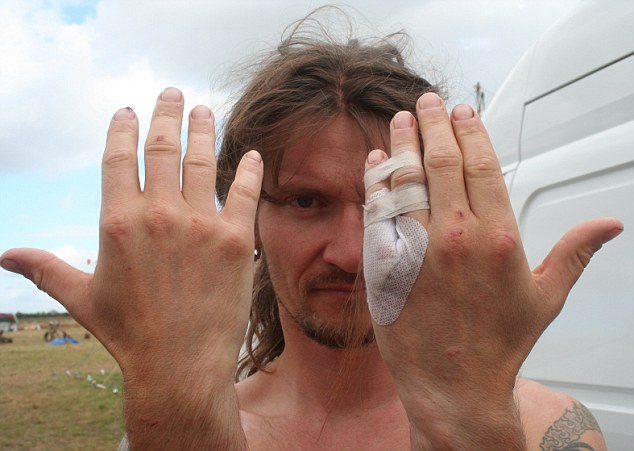
Mark Kennedy showing injuries after a beating by uniformed police, Climate Camp 2006
The police have asserted that many documents are missing. What they have not done is make inquiries as to just why they are missing. There was a lack of serious investigation by the police into how the NPOIU worked. This left them all in the dark.
MISSING CONTACT LOGS
For example, they had not addressed how the NPOIU operated as a team, nor dealt with Kilroy’s previous observation that the contact logs were only a snapshot of the overall picture. This was particularly important given the material covering when Kennedy entered into a relationship with Kate was missing.
Perry, she said, was drawing inferences from the evidence that were not actually substantiated by the documents he relied on. In fact, the material submitted was confusing the issue rather than shedding any light. The real problem lay with the police failing to investigate adequately in the first place. All they could offer was a tendentious lawyers’ interpretation, when the more powerful one is in fact provided by Kate Wilson.
Pointing out their failures, Kilroy addressed the intelligence flow within the NPOIU. She called up a document from disclosure setting out how the unit supposedly worked from 2007 onwards. This was a diagram which set out the various parts of the NPOIU and how intelligence came into the unit and passed out again, including through informers and undercovers. It showed that there were apparently firewalls in place to prevent the rest of the unit effectively knowing about the undercovers.
Perry suggested the diagram reflected how the unit worked prior to 2007. Kilroy drew the Tribunal’s attention to the very next bit of disclosure – an internal contemporary email from someone in the NPOIU attached to the same intelligence flow diagram.
A CLEAR TWO-WAY PROCESS
Damningly, the email, written by O-137, an NPOIU officer, said the intelligence flow diagram was ‘dishonest’ and undercover units were not in fact distinct and firewalled from the rest of the unit. Rather, there was a clear two-way process which included the undercovers and that if the NPOIU tried to impose such a firewalled approach the entire process would break down:
‘Are we saying we should not really be doing this and so are trying to hide it…If the rules prevent this then they are clearly wrong and need changing’
Kilroy used this to illustrate the point that one could not rely solely on the documents, as Perry was asking of the Tribunal. Documents such as this could be misleading in themselves – the wider picture was necessary to get to the truth.
She pointed out that Perry had advanced the case that management were entitled to place their trust in Kennedy as an experienced police officer who they were unaware was having intimate relationships. However, this was in fact the first time police had ever made such arguments in Kate’s case.
Previous defences had not suggested EN31 and others were entitled to trust Kennedy on this basis. Instead the police lawyers had accepted the contradictory position, that those managing Kennedy should have been more intrusive into his life as an undercover.
It also was difficult for Perry to rely on the police Code of Conduct requiring Kennedy to be honest and maintain integrity. This conflicted with RIPA itself, which permitted dishonest relationships through undercover policing.
Kilroy then moved on to rebutting the point that Kennedy would be expected to be called as a witness. It was quite clear that this was not the case. Both HM Inspectorate of Constabulary and the Serious Organised Crime Agency said it was not an evidence-based operation, but solely focused on intelligence gathering.
THE ROSE REPORT
To illustrate, she drew attention to the report by Sir Christopher Rose into Kennedy’s role in the collapse of the prosecution of activists who had attempted a protest at the Ratcliffe on Soar power station.
‘The Christopher Rose report is clear that it was always the primary intention that MK’s identity should be protected over and above any prosecution. The only reason the Ratcliffe miscarriage of justice even came to light was because Lisa discovered MK’s true identity.’
Instead, the Rose Report showed the NPOIU had sought to protect Kennedy’s role as a spycop and this had trumped the rights of the activists being prosecuted. In fact, the Ratcliffe on Soar case only collapsed because he had been outed as an undercover and agent provocateur.
She was able to point to the fact that the Head of the NPOIU had provided Rose with a statement asserting that the undercover’s identity must be protected and he would not be allowed to enter the evidence chain. This undermined Perry’s point that having a relationship would have compromised Kennedy because he couldn’t have given evidence. It is clear the intention was that he would never be allowed to give evidence in the first place.
Kilroy went further, pointing out it was not until 2016 that the police formally accepted that undercovers having sexual relationships was intrinsically unlawful. There are widespread examples of undercovers engaging in the practice over many years. The defendants had not looked at the culture of the units. In support of this, she also noted that the Special Demonstration Squad’s Tradecraft Manual, which did speak of ‘fleeting relationships’, was never countermanded by any senior officer – a point which also went to the police meeting their positive obligations under the European Convention on Human Rights.
The Rose Report also highlighted another issue touched on the previous day – Perry’s request that the Tribunal favour the conclusions of the SOCA report over that of HMIC. By using remarks from Rose, Kilroy was able to show that the SOCA report had been conducted under the aegis of HMIC, and fed into it. In fact, the SOCA report was an annex to the HMIC one. Rather than being structurally separate, as Perry had claimed, they were inextricably linked – which meant his points about placing greater weight on SOCA than HMIC fell flat.
RIGHTS IN THEMSELVES
Having dealt with the above issues, Kilroy returned to Articles 10 and 11 (rights of free speech, and assembly). She made the point that they are rights in themselves. Although in this case they are often connected to the sexual relationship, they need protecting on their own merits. They are part and parcel of a democratic society.
A final substantive was whether the Tribunal could rely on Kennedy’s evidence as given to the Home Affairs Select Committee, or whether it was inadmissible for legal reasons to do with Parliament. In particular, the police attempting to impugn his evidence might be in contempt of Parliament. The issue was considered as ‘vexing’ and the Tribunal invited written submissions on resolving it.
With that, the main hearings came to an end. Judgment will be handed down in a couple of months, after which the judges will look at remedies. Lord Boyd then gave a effusive thanks to Kate for all her efforts. An emotional ending to an exhausting process.
